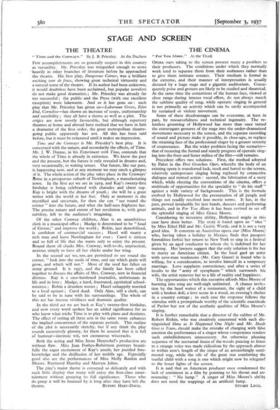STAGE AND SCREEN
THE THEATRE
I, Time and the Conways." By J. B. Priestley. At the Duchess FEW accomplishments are so generally suspect in this country as versatility. Mr. Priestley was misguided enough to score
• heavily in other branches of literature before he approached
• the theatre. His first play, Dangerous Corner, was a brilliant exciting tour de force, showing. great technical virtuosity and a natural sense of the theatre. If its author had been unknown, it would doubtless have been acclaimed, but popular novelists do not make good dramatists ; Mr. Priestley was already far too successful ; the public and the Press (with one excellent exception) were lukewarm. And so it has gone on : each play that Mr. Priestley has given us—Laburnum Grove, Eden End, Cornelius—has shown an increase of scope, craftsmanship and sensibility ; they all have a theme as well as a plot. The critics are now mostly favourable, but although repertory theatres at home and abroad have realised that we have in him a dramatist of the first order, the great metropolitan theatre- going public apparently has not. All this has been said
• before, but it must be reiterated until it makes an impression.
Time and the Conways is Mr. Priestley's best play. It is concerned with the nature, and secondarily the effects, of Time. Mr. J. W. Dunne, in his Experiment with Time, contends that the whole of Time is already in existence. We know the past and the present, but the future is only revealed in dreams and, very occasionally, to waking senses. Our future, like our past, is happening now, and at any moment we may catch a glimpse of it. The whole action of the play takes place in the Conways' Rome in a prosperous suburb of Newlingham, a manufacturing town. In the first act we are in 1919, and Kay's twenty-first birthday is being celebrated with charades and claret cup. Kay is bright with the dreams of youth ; she will be a great writer with the world at her feet. Only at moments is she mystified and uncertain, for then she can " see round the corner " into the future, and what she half-sees frightens her. The precise nature and extent of her revelation is, with great subtlety, left to the audience's imagining.
Of the other Conway children, Alan is an unambitious clerk in a municipal office ; Madge is determined to be " head of Girton," and improve the world ; Robin, just demobilised, is confident of commercial success ; Hazel will marry a rich man and leave Newlingham for ever ; Carol is sixteen and so full of life that she wants only to enjoy the present. Round them all clucks Mrs. Conway, well-to-do, unpractical, anxious simply to have all her chicks under her wing.
In the second act we, too, are permitted to see round the corner, " look into the seeds of time, and say which grain will grow, and which will not." Most of the seed has fallen on stony ground. It is 1937, and the family has been called together to discuss the affairs of Mrs. Conway, now in financial distress. Kay is a case-hardened journalist, unfortunate in life and in love ; Madge, a hard, frustrated, egotistical school- mistress ; Robin a drunken waster ; Hazel unhappily married to a local upstart ; Carol dead. Only Alan, still a clerk, can be said to be in tune with his surroundings. The whole of this act has intense vividness and dramatic quality.
In the third act we are back at Kay's twenty-first birthday, and now every word spoken has an added significance for us who know what tricks Time is to play with plans and destinies. The effect of setting all three acts in the same room enhances the implied concurrence of the separate periods. This outline of the plot is necessarily sketchy, but if any think the play sounds excessively gloomy, let them be assured that it is full of humour—intrinsic wit, not extraneous wisecracks.
Both the acting and Miss Irene Hentschel's production are without flaw. Miss Jean Forbes-Robertson portrays beauti- fully the eager excitement of Kay's youth, her puzzled fore- knowledge and the disillusion of her middle age. Especially good also are the performances of Miss Molly Rankin and Messrs. Raymond Huntley and Mervyn Johns.
The play's major theme is conveyed so delicately and with such little display that many will enjoy the first-class enter- tainment without grasping its full significance. Those who do grasp it will be haunted by it long after they have left the










































 Previous page
Previous page